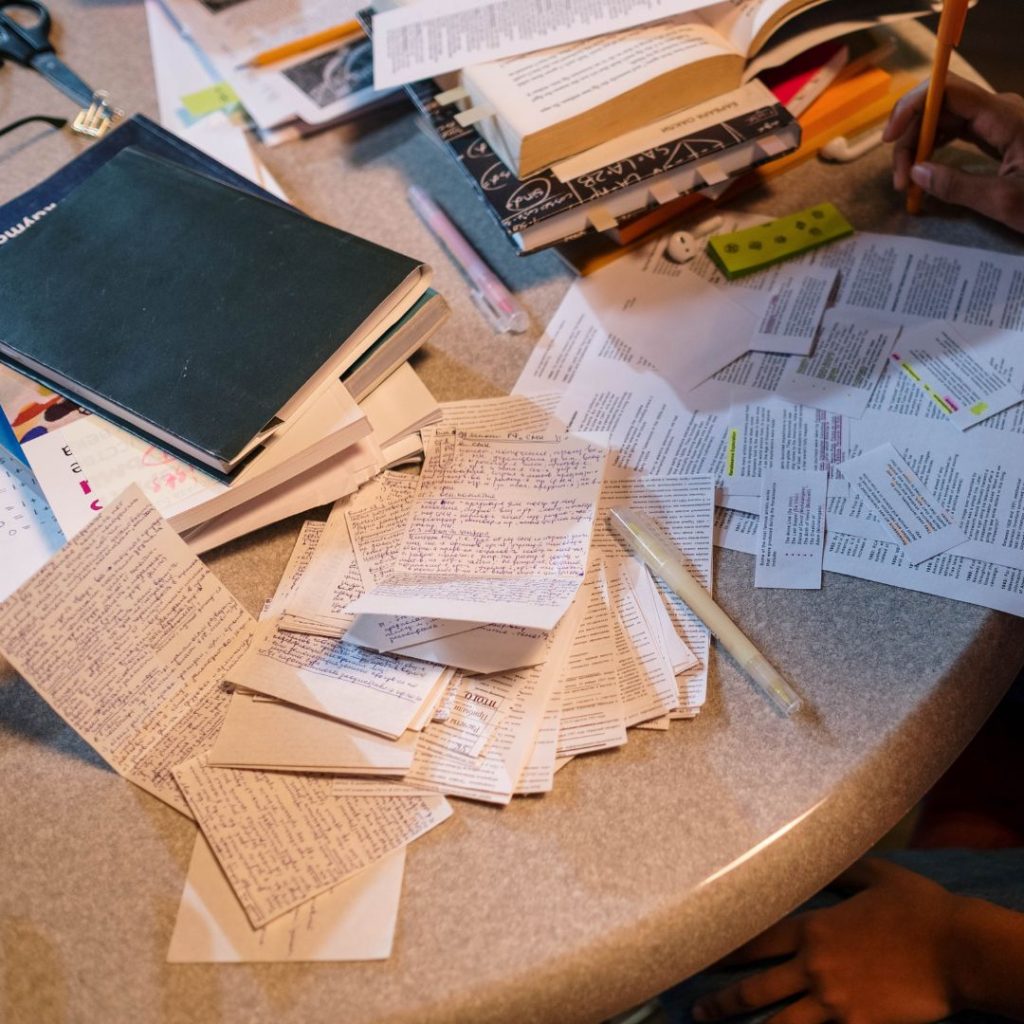Why Writing is Revising (And Why it Works)
Zipporah Marse
Staring at a blank document isn’t easy. Wherever you’re writing—whether it’s on Google Docs, Microsoft Word, or a plain old piece of paper—the bright white of that page gets increasingly more blinding as you realize how few words you have to populate it. Many writers share this anxiety. What if nothing comes out? What if what does come out is the worst ever? Why can’t there already be words on this page?
Well, what if I told you there can be words already on the page?

Many have heard the phrase “writing is revising,” but what does it actually mean? Revising is more than taking a rough draft of a piece and fixing a few misplaced words or commas; it’s revising. It’s overhauling the entire project and changing it to make it that much better. It’s taking two sentences from a note on your phone and turning it into three pages of narrative. It’s the sapling growing from a seed, getting bigger and bigger until it finally turns into a tree; all you have to do is water it.
Sorry for calling your passion project a tree. Stay with me.
If you think of revising as the act of turning something small into something big, suddenly there is no blank page to work-from-nothing on; there is only a jumble of notes that you have to revise into a story. So, take your abstract thoughts from your journal onto your page, record yourself talking about your project and transcribe your words into full sentences, simply type the names (or just adjectives) of your main character onto your Word doc. Give yourself words to stare at instead of a blank page.
I’m not here to lecture you about plotting, but plotting is the easiest way to get words to come to you. Whether you want to die by the hero’s journey, concretely separate your scenes into three acts, or just include a simple beginning, middle, and end, plotting gives you parameters to fit your words into. Give yourself a seed to grow into a tree instead of trying to will one into existence from nothing.
Once you have characters, plotting (or a general idea of where you want the story to go), and a few sentences stuck in your mind, you can either jump right into your first attempt at a draft or you can keep fiddling around, writing just a few paragraphs at a time or expanding on some of your research—as long as you get around to your first draft sooner or later. With your notes behind you, it doesn’t matter if your first draft is the worst, because deleting it doesn’t mean going back to nothing, it means going back to your notes, which you’ve already built on before.
Once you have enough of your narrative in actual prose form, then you might reach what people usually refer to as revising. This is scary, but it shouldn’t stop you. During this critical trek through your writing, you must remember that even if you erase the pages you just finished writing, that doesn’t mean you wasted time or the words you wrote are useless—quite the contrary. It means you’ve developed your world, characters, and voice enough that what you wrote at the beginning doesn’t fit anymore. It’s concrete proof that you’ve grown and have already learned so much about yourself and your story in just those few pages.

When I write, I always have a specific document I call “dumping grounds,” where I put paragraphs that I really like but simply didn’t fit in my story anymore. Maybe I’m sensitive and can’t stand killing my darlings, or maybe I will be able to return to my segregated paragraphs and pull something useful out of them later, but just the act of saving them, and not outright deleting them, always gives me the boost I need to let myself completely rewrite something with a brand-new draft.
Having copywriters, or just close friends you trust with your story, can be great, but don’t let them deter you from properly revising something. If you don’t love the way a specific scene ends, don’t wait for line edits to make it work better; go back, go big picture, and figure out if there’s another way you can end the scene before giving your trusted narrative to an editor. While you’re at it, let the edits you receive wash over you like that water pouring over a sapling. If you’ve already been willing to cut apart and redo your work several times, the few pricks and prods of editors shouldn’t feel like more than a quick sting. You, and your story, are growing. Take the advice and grow.
Sometimes, you get to the end of a story and you’re satisfied. Sometimes, you’re not. Unless the due date is right around the corner, you need to give your story time to cement on its own without your wide eyes watching over it every second of the day. Your satisfaction, or dissatisfaction, will fade, and you’ll eventually be able to return to your story with the perspective needed to continue it. Whether continuing means adding or taking away a few scenes or once again starting from scratch with a whole new draft, you’ll be ready to take that task on, because that’s what you do. You’re a writer. You write. Yet, at this point, with all of that behind you, you’re certain that what you’re doing right now is revising.
0 Comments